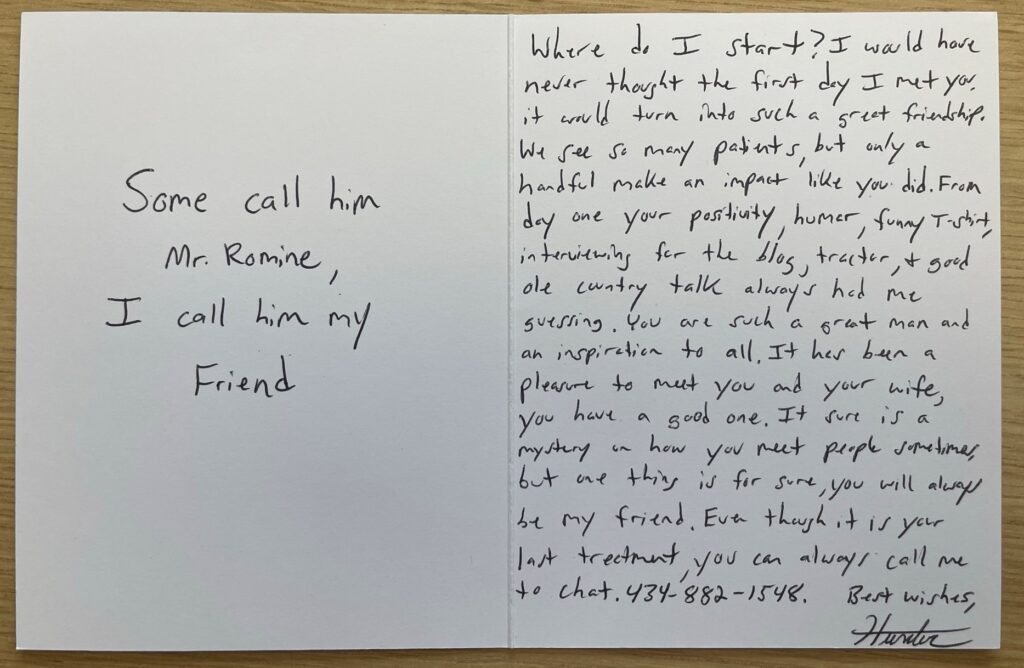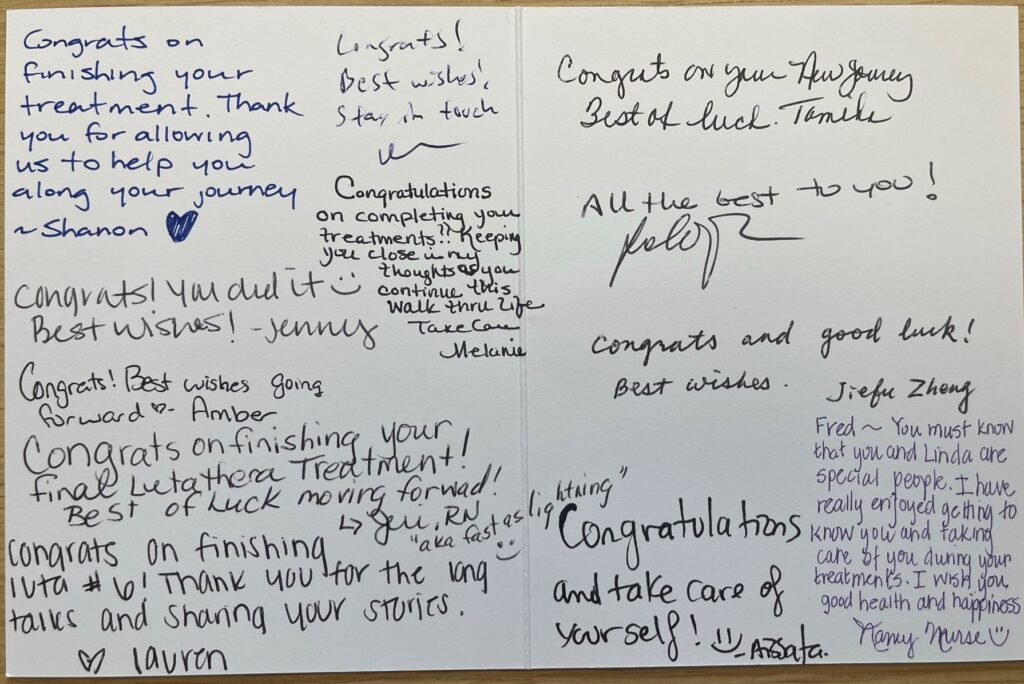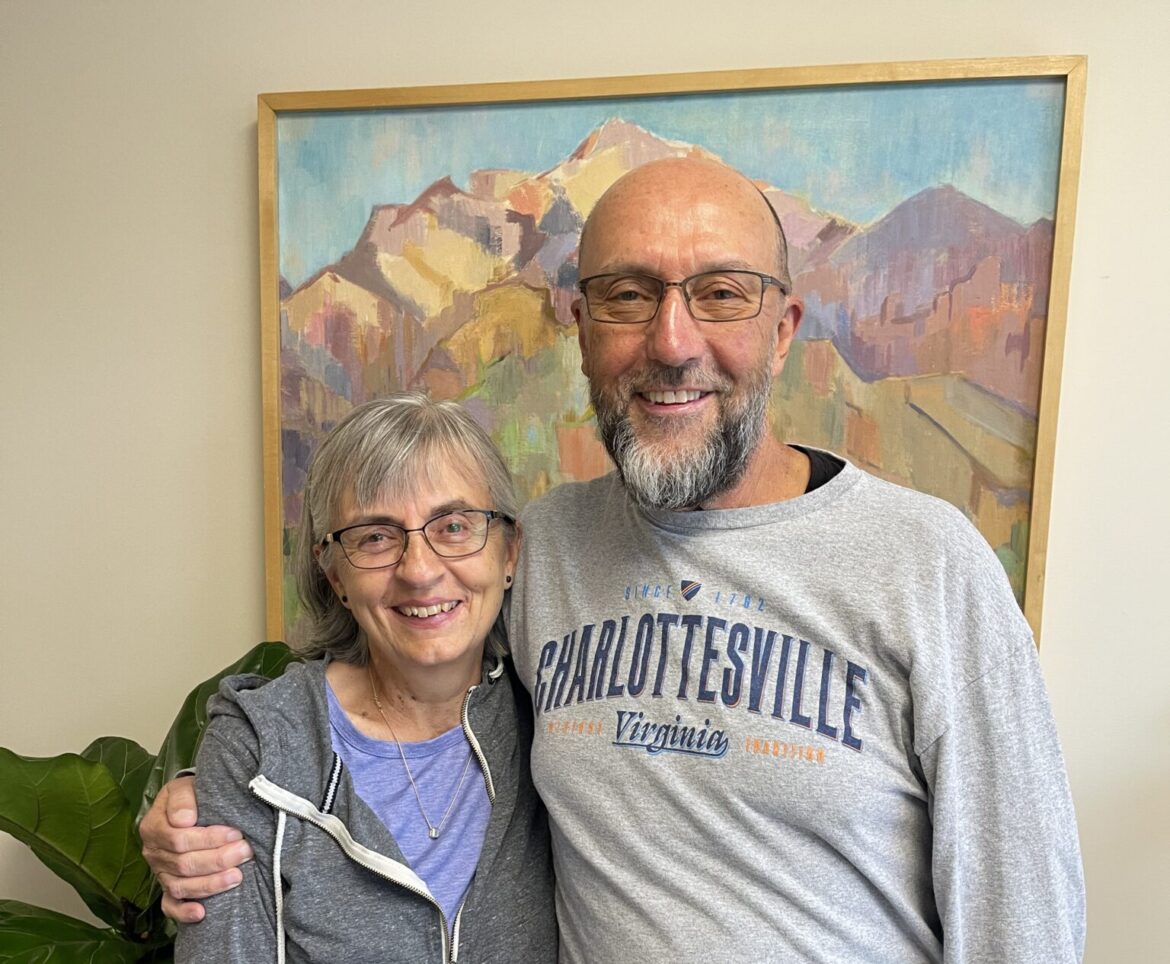In 2021, Fred Romine was the first patient to complete all four rounds of Lutathera treatment at UVA Health. Two years after his first interview about his experience with Lutathera, he now shares about his medical journey and how he uses his story to help others.
Fred Romine doesn’t shy away from talking about his experience battling neuroendocrine cancer – for one simple reason.
“It gives people hope,” he says.
When we spoke to Fred in 2021, he was the first patient to complete a full Lutathera treatment at UVA. Lutathera is a treatment option for neuroendocrine tumors that’s still relatively new in the United States. UVA Health is one of the few hospitals in Virginia to offer it.
It’s been a long journey for Fred. In 2011, he was diagnosed with a neuroendocrine tumor in his small intestine and mesentery. In 2016, he had a surgery to remove part of his liver that stopped him from returning home for three weeks. This was followed in 2018 by a minimally invasive interventional radiology procedure called radioembolization, during which doctors deliver microscopic radioactive beads to stop cancer cells from growing. When Fred continued to feel unwanted effects from the tumors in 2020, he began Lutathera.
Today, Fred still returns to UVA for regular scans as well as Lanreotide injections to slow the cancer growth. He says he’s experienced difficult times since his diagnosis, but the treatments have offered a better path forward.
“I felt so, so bad,” he says. “With getting the treatments, it’s kind of got me over the bridge to be able to function like normal.”
What is Lutathera?
Lutathera is the first Peptide Receptor Radionuclide Therapy (PRRT) approved to treat NETs in the United States. It has two components: molecules that bring the drug directly to the tumors, and radiation that helps shrink and kill those tumor cells.
Because Lutathera specifically targets tumor cells, the effects of the radiation are much less intense than with traditional radiation therapy. That means fewer side effects.
Lutathera is given in four infusions, eight weeks apart. In between those infusions, patients have blood tests done every two weeks. The total treatment time is about eight months.
Click here to learn more about the Lutathera treatment experience at UVA Health.
The Importance of Support
Fred knows how difficult cancer can be – even if it’s not always visible to outsiders.
“Once you get to treatments and stuff, people say, ‘Oh, you look just fine!’ ‘What are you? You’re not sick. You look so good today.’” says Fred. “They don’t know what we went through the night before, you know?”
Read more about Fred’s treatment experience here.
It’s the reason that having a support system is so important, he says. And Fred’s most important supporter by far is his wife Linda. (The secret to their marriage of more than 50 years? “You’ve got to keep them your best friend,” says Fred.) When Linda accompanies Fred during the three-hour trip from Carroll County to Charlottesville, she makes sure that the trip always includes more than just Fred’s treatment.
“We try to do something fun along the way, either coming up here or while we’re here,” says Linda. “Because it can’t just be totally negative all the time – that’s draining.” Recently, they went to Carter’s Apple Orchard in Charlottesville at the recommendation of Chief Nuclear Medicine Technologist, Hunter Beverly.
When Fred’s sitting at home on the sofa, close by are always two cards written by UVA medical team members who have helped him throughout his treatment. One card, written by Hunter on his last treatment day, reads, “Some call him Mr. Romine. I call him my friend.”


“Hunter has been a real support for me,” says Fred. But he emphasizes that everyone at UVA has helped him tremendously: UVA Radiology’s Dr. Lale Kostakoglu, technologists like Hunter and Angela Yancey, and departmental nurses and techs; as well as oncology staff including Dr. William Grosh, Dr. Matthew Reilley, and nurse Kira McBee.
Linda adds: “You asked what helps to get us through these types of things. It’s people like this.”
Helping Others
Compared to other types of cancer, neuroendocrine tumors are relatively rare. For that reason, Fred and Linda work to educate everyone with Fred’s story — sometimes with life-changing results.
“There’s so many people that don’t even know what this type of cancer is,” says Fred, “and so we’ve encouraged them and we’ve helped some people out.”
One of those people was just a stranger at the supermarket, says Fred. “One thing led to another [for him] to share about his cancer diagnosis. I said, ‘Look, I think we’ve got something pretty similar here.”
Because Fred shared his symptoms with that man, says Linda, the conversation spurred him to receive medical attention at UVA, where doctors caught and diagnosed him with a neuroendocrine tumor.
Fred and Linda know that the topic of neuroendocrine tumors can be scary and complicated. Lutathera was able to help Fred, but it’s far from a cure-all.
“There’s no simple fix to this type of cancer,” said Fred.
But as new treatments are developed, Fred and Linda are looking for ways to impact future cancer patients. That’s why they’re planning to donate a portion of their estate to UVA Cancer Center and the Department of Radiology and Medical Imaging.
“We’ve talked about it a lot,” says Linda. “We want to help the next person with neuroendocrine cancer [and other] rare cancers.”
Ultimately, Fred wants his story to inspire people not to give up. “There’s been a lot of times that you get so depressed that you think there is no hope,” he says. “But there is.”
To learn more about Lutathera treatment for neuroendocrine tumors at UVA Health, click here. Referrals for Lutathera must come from your hemotologist, oncologist or other ordering provider. Providers: refer a patient for Lutathera by calling the Lutathera nurse at 434.982.5240.



